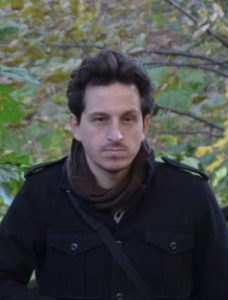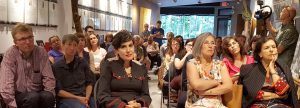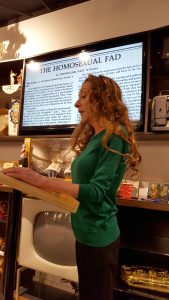Historian Dr. Gilberto Fernandes hosted “The Summer of ’77: How Emanuel Jaques’ Murder Changed Toronto,” a community conversation to reflect on the crime’s effect on the Portuguese and LGBTQ communities.

Dr. Gilberto Fernandes
The event began with a series of presentations by York University historians — Fernandes, who is a Postdoctoral Fellow at the Robarts Centre for Canadian Studies, Daniel Ross, and Tom Hooper — and noted advocate for the rights of Canadian sex workers Valerie Scott.
“One of the most important conversations, which we started last night, was about Portuguese-Canadian queer history and identity, and how it is tied to the legacy of ’77,” Fernandes said. “Together we identified a path forward: find more Portuguese-Canadian LGBTQ (his)stories, showcase them, and build on them, so that Portuguese-Canadian queer adult and youth can have a frame of reference in which to talk openly about their experiences, and conciliate these identities in a positive and meaningful way.”
Over fifty people, including members of the general public, community advocates, and historical agents, such as the LGBTQ activist Ed Jackson and retired Toronto Star journalist Dale Brazão, gathered at The Gallery of the Portuguese Pioneers on June 22 to remember and discuss the grisly murder and its lasting impact. A discussion followed the presentations, and many in attendance recalled the events surrounding the boy’s death 40 years prior.

Crowd at “The Summer of ’77: How Emanuel Jaques’ Murder Changed Toronto” Community Conversation
In 1977, a four-day search for Emanuel ended with the discovery of his body on the roof of a rundown building behind a Yonge Street body-rub parlour. The 12-year-old Portuguese shoeshine boy had been lured away from his spot on Yonge Street with the promise of extra money. After being led to the parlour, he was violently and sexually assaulted and then murdered. As the details surfaced surrounding Emanuel’s murder, a “moral panic” swept through Toronto, which the municipal government rode to push forward its plans to revamp Yonge Street’s “sin strip” between Gerrard and Dundas streets. Toronto police raided and shut down strip clubs and parlours in that section of Yonge Street, forcing sex workers onto the street, where they were an easier target for sexual predators.
Some sections of the Portuguese community, which in recent years had lived through important moments of political activity and public protest, took their anger to the streets, first in a funeral attended by 4,000 people, and later at a large demonstration on Nathan Phillips Square, reportedly attended by 15,000.
The LGBTQ community was scapegoated, becoming the target of open and violent homophobic hatred, in tandem with other anti-gay movements rising in Canada and the U.S. Toronto’s Portuguese shared the Jaques’ family loss in a collective way and saw Emanuel as a symbol for all children in the community, for whom immigrant parents had sacrificed so much.
During the dialogue, community members shared how this event altered their views of Toronto, their memories of growing up in the city at the time, their roles and expectations as Portuguese children, and the enforcing of “public morality” through policing techniques that discriminated against gay men and sex workers.

Valerie Scott, Canadian Sex Workers advocate
“Gay men and sex workers were not responsible for Emanuel’s death, but they paid. A person’s murder should not be used to further political interest; we know everything about his murder and its politics but nothing about the young boy whose life was stolen. Did he like to play hockey? What was his favorite color?” said Canadian Sex Workers advocate Valerie Scott.
“This community conversation created a safe and welcoming space for community members to reflect on the tragedy,” said York University alumna and staff member Rowena Linton. “It fulfilled the goal of Community Conversations to bring community members together to engage in critical dialogue on subject matters that are of interest to them.”
The conversation was held in collaboration with the Global and Community Engagement Office and with the Portuguese Canadian History Project. Community Conversations continues to encourage stimulating, inspiring, and inclusive dialogue among different communities across the GTA, on topics that are relevant and meaningful to them. Our goal is to actively enhance public engagement on a wide range of topics and to create inclusive spaces to exchange ideas. The Faculty of Liberal Arts & Professional Studies invites faculty members and community partners to apply to host future Community Conversations. The Global and Community Engagement unit encourages moderators to share their creative ideas. Get more information on upcoming Community Conversations, and apply online to host a Conversation.
